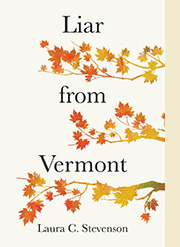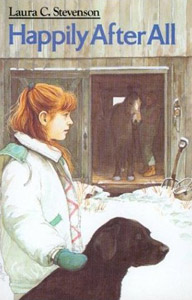A New Series: One Minute Reviews of
Books by Vermont Authors
Laura's column "One Minute Reviews" has appeared bi-weekly in Wilmington, Vermont's Deerfield Valley News since 2015. In April 2018, she found that no Vermont periodical consistently reviews all commercially published fiction and non-fiction by Vermont authors, so she started a series to fill that void. Published reviews from that series and some earlier reviews of local authors are listed with links to a scan of the printed copy. Reviews still in queue are listed without links until they appear in print.
The books reviewed in this series are available through Wilmington's Pettee Memorial Library, the Whitingham Free Public Library, and locally owned Bartleby's Books in Wilmington.
Deerfield Valley News, 6/18/2020
The Difficulty of Avoiding a Father's Death
Jay Kirk, Avoid the Day: a New Nonfiction in Two Movements. Harper Perennial, 2020
The day to be avoided in this "new nonfictional" book is the day of Jay Kirk's father's death. It's imminent, but the father's decline is slow enough for Kirk to avoid it in a variety of ways. He searches for the lost manuscript of Bela Bartok's Third Quartet. He journeys to Transylvania to deepen his knowledge of the folk music tradition that "made Bartok Bartok." And finally, he takes an eco-tourist cruise in the Arctic on which he and a college friend try to shoot a horror movie. Coloring these events is a series of meditations on "experience," seen through the haze of more familiar forms of avoidance: alcohol and drugs. Kirkegaardian reflections and literary references mingle with portrayals of Bartok's music and career, sardonic passages of travel writing, and memories of a childhood endured in the shadow of Vermont State Hospital ("formerly Vermont State Asylum for the Insane"). As Kirk approaches psychological breakdown in the final chapters, his memories become vivid flashbacks to scenes of his conflict with his father and his retarded brother.
The most interesting section of the book is its First Movement, which concerns Bartok and his music, interspersed with digressions into Kirk's years-long conflict with his dying father. The opening chapter reconstructs the exiled Bartok's 1941 sojourn in Vermont, to which he'd fled the noise of New York. Here the reader is introduced to Bartok's primitive, extremely heavy Edison phonograph, and with it the wax cylinders of recordings he had made years before of Transylvanian peasants singing and playing their native songs. The scene then jumps to the Bartok Memorial House in Budapest, where Kirk—from now on in the center of the book—looks at a diorama of Bartok's travels and instantly thinks of his father's electric trains, then elides into a reconstruction of Bartok's "discovery" of Transylvanian folk melodies. What follow are a-chronological, cinematic scenes of Kirk's search for the "lost" manuscript of Bartok's Third Quartet, a trip through Transylvania with a friend who wants to investigate the roots of klezmer bands, and, interspersed in these experiences, Kirk's substance-induced memories of his boyhood in Waterbury, only two train stops from Bartok's summer visit. As the memories (and the substances) increase, Kirk re-creates the plot of Bartok's Cantata Profana, which concerns a father whose nine hunter sons escape his clutches as they are magically turned to stags and refuse to return to him. In the book's Second Movement, set on the cruise ship, cinematic scenes become literal as Kirk and his friends film a movie. While portrayals of the cruise are perfunctory, this section of the book contains some of the most powerful writing in the book as Kirk re-experiences violent scenes in which he and his father fight for mastery.
The complexity of Kirk's book is so great that the description on its back (at least of the uncorrected proof) refers to connections not present in the text. The nonfiction is not so much new as post-modern; its superiority-complex intellectualism is perhaps exciting to academics but difficult for ordinary mortals to follow. The writing contains bravura long sentences, brilliant action scenes, philosophical speculation—and occasional cheap shots. Transylvania, for example, is used to tie Bartok's search for folk music to Bram Stoker's Dracula and the traditions of vampire literature; Kirk would have it that the great composer and ethnomusicologist used folk music as "plasma" which he sucked from peasant culture. The reductive image is lamentable, and unworthy of a writer capable of portraying grief, self-immolation, anger, detective work, and journalistic research in a single book.


